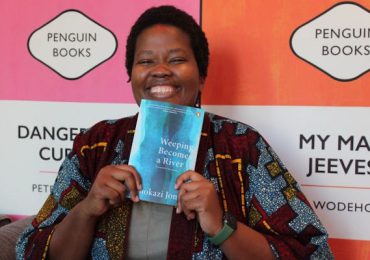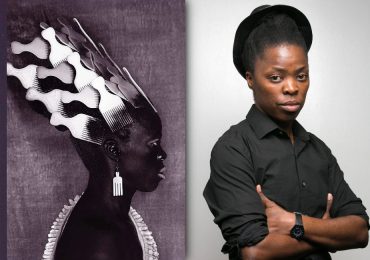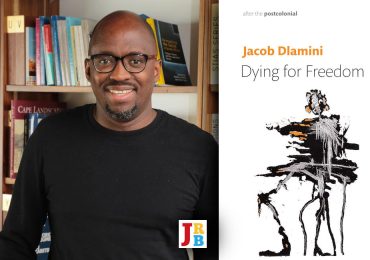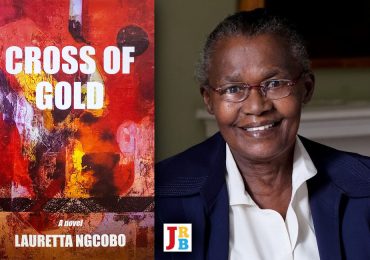The JRB presents an excerpt from The Weight of Skin by Alastair Bruce.
The Weight of Skin will be published by Penguin Random House in January 2020.
~~~
‘He too will I take in.’ Jacob Kitara hurries out to the man who has appeared on the corner of Chester Street. ‘Though he is the very image of a vagabond I will take him in.’
The newcomer slouches at the end of the street, hands almost touching the ground, swaying from side to side. His gait, his bearing, that of a fighter: a fighter, and not a reasonable man, not one for talking. He will need to be careful with this one.
A window on the second floor allows Kitara a view of the street. He spends hours there most days. When he spotted the man he ran from the ledge where he sat to get to him before others did. He needed to hurry. There are others out there still, though fewer now; others who would also be looking for a man like this. But when Kitara reaches the street he sees no one else.
He has become adept at reading injuries: a lean to the left betrays a shallow knife wound, a slump of the shoulders a broken rib. In some, no surface wound at all but the empty look of one who has seen things they do not wish to see. He has read these signs on many, those he encountered on his walks through London and those who appear on Chester Street, asking, sometimes begging, for sanctuary.
He must provide sanctuary, for a time. That is what he must do now, what has been given to him to do.
Those first words begging for assistance are often all Kitara will get from them. Though he presses them for more, for the truth, for tales of how they came to be here, where they are from, whether they left others behind, he receives few answers. He does not take offence. How could he, when he knows what goes on beyond the walls of his building?
Later, some of them will open up to the carers. Standing outside the ward, Kitara will hear their stories: tales of refuge, betrayal, families left behind; some sharing their tricks, boastful of how they had managed to survive when others had not.
He listens, patches them up, but then they have to go. He cannot keep them here and must throw them out if they do not go willingly. He opens the inner and outer doors at an appointed time, checks the street, sends them on their way. A few say goodbye and give thanks. Most run. Some try to turn back and beg to remain but must be shunned.
They vanish, never to be seen again.
Kitara has a small staff. There are fewer of them than when the building housed the charity they worked for, but he is grateful that what they lack in numbers and medical training, they make up for in the steadfastness of their care.
He knows it would not work without his office manager, Adina. She has a rota for the beds, makes sure meals are served on time, that everyone has water, those who need it get bathed, and dressings are changed regularly.
She wishes he would not do what he does. She wishes he would not receive all these people – she says he plays a dangerous game – but when Kitara asks what else she would have him do, he gets no reply. He tells her, and tells himself, there are times when one must not turn or run away, when one must do the right thing, though it might seem repellent at first.
He has not been more than a few metres from the building for weeks; his colleagues have not left it at all. They sit, they give care, they wait. It is safer here. They will not be touched. He believes this, believes in what he has been told.
They are locked in, shut away from the outside. The building is surrounded by wooden boards on the ground floor, erected a few feet away from the building on the edge of the road, as if it is an abandoned building site. There are more boards across the first-floor windows that face the street. Only the second floor is uncovered. They are used to the dark.
There are clues to their presence, of course. If one looked closely enough, one would see that the door in the wooden boards is padlocked from the inside, the flickering light from behind the upper windows, and an ear to a wall, should one get past the wooden barrier, would hear the breathing of those hidden inside.
He walks quickly up to the visitor. As he gets closer, he sees that the eyes that have appeared to follow him are in fact blank. Blood, still wet, stains the man’s shirt below his ribs on the right.
Kitara stands face to face with him now and can smell him. Just for a moment he gets something familiar. Though he cannot quite place it, it makes his heart lurch, whatever it might be. A smell of the old country, perhaps.
He has no time to ponder this as the man falls forward and Kitara has to grab him to stay his fall. He places his arm under the man’s and turns back towards the building.
Kitara sees the policeman then. He has been posted for their protection, the English say, though Kitara knows it is for other reasons. The policeman stands, watching the two men, blocking the way to the door.
‘Stop. Who is this one?’
At first Kitara remains quiet but the policeman does not move.
‘He is an employee. He will not leave again.’ He does not know why he says this instead of the truth.
‘You are not supposed to leave.’
Kitara straightens, a difficult task when supporting the weight of another; looks the policeman in the eye. The man he sees before him is still a child. Thickset and almost as tall as Kitara but seems no more than sixteen or seventeen. They are taking them younger these days, he thinks. Anyone will do.
The policeman appears to relent under Kitara’s stare. ‘Looks like he got what he deserves.’
Kitara is about to say something but thinks better of it and steps towards the door.
‘What is his name?’
‘Makana. Sipho Makana.’
Kitara closes his eyes in a slow blink. His second lie. Why that name? It came out of nowhere. It is a mistake but the chances of this child knowing who that is, or was, are slim. He must just hope the policeman doesn’t check the name against those of his staff.
The officer snorts but stands aside. ‘I will be watching you.’
~~~
- A South African by birth, Alastair Bruce grew up on a smallholding outside Port Elizabeth and in the city of Cape Town, where he attended the University of Cape Town to study literature. He now lives in a tiny village in the United Kingdom, works in London in digital media and is currently writing his third novel. Follow him on Twitter.
About the book
Exiled Jacob Kitara takes in injured compatriots and nurses them in a boarded-up building. Social unrest has emptied the streets of London, movement into and out of the country has been suspended, and those who remain are in hiding.
When a young man makes his appearance, insisting that he is Jacob’s son—a man presumed dead, torn from Jacob’s life by war and guilt over the fate of the boy’s mother—Jacob is driven to anger.
But can this stranger offer Jacob a chance to reach back to a different continent, to the foot of Africa from where he has been banished, to atone for the past?
The Weight of Skin is a poignant tale of personal and political responsibility, and of the intricate narratives of family and nationality that bind us.





